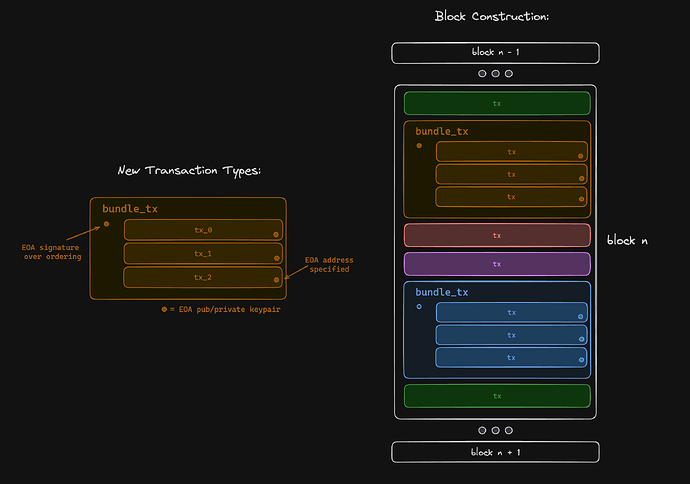Discussion thread for EIP-7727
Today, all sequencing logic for a mainnet block is controlled by the single winner of the JIT PBS block auction. This is problematic as sequencing, the choice of who gets to alter what piece of state in what order, influences value flow. The goal of this EIP is to give transactions and smart contracts more control over how they are sequenced through explicit delegation of local sequencing rights.
Technical Summary
This EIP aims to enable more fine-grained and multi-party block building by introducing two new EIP-2718 transaction types and one new opcode. These new additions would provide:
- The ability for transactions to delegate their local sequencing to a specified external party.
- The ability for an external party to build ‘bundles’ of transactions that are run in order in a block.
- The ability for smart contracts to see who put the transaction in a bundle if the transaction was in a bundle.
One of the EIP-2718 transactions would extend normal transactions to include two new fields: bundle_signer and an optional block_number. The bundle_signer would be the entity who is delegated local sequencing rights for the transaction, and the block_number would be the block number that the transaction is valid in if not zero.
The other EIP-2718 transaction would be a meta-transaction whose only function is to order transactions that delegated sequencing rights to the signer of the transaction. This meta-transaction could only sequence transactions that delegated to it and could also delegate itself to another external party and specify a block number. This transaction would not start an execution context for itself.
The opcode, potentially named BUNDLE_SIGNER, would expose the most immediate external party who put the transaction into a bundle if present.
Other relevant pieces of technical information:
- Unlike searcher PBS bundles, there is no revert protection provided to the sequenced transactions. This is to enable this EVM change to work with all types of EVM block builders, including ones that do not do simulations.
- If a transaction in the meta-transaction’s bundle is invalid, the bundle signer is charged for the invalid transaction as if it were just
CALLDATAbytes. This is for DOS protection and due to the inability for a bundle creator to control all state that it is building on. - If a transaction specifies a
bundle_signer, it must be included in a bundle signed by the signer to be valid. This is to prevent competition between the total block builder and the delegated bundle creators.
Example Use Cases
Together, these new forms of expression would enable:
- Smart contracts to auction off the right to be the first entity to operate on a piece of state, such as:
- AMMs auctioning off the first swap to lessen LVR. (Example using PBS searcher bundles).
- Oracles auctioning off the rights to be the first transaction post update to cover posting costs.
- Lending protocols auctioning off the right of liquidation of hard-to-price collateral.
- Smart contracts to order transaction operations for user benefit, such as:
- Lending protocols placing user liquidity adds before liquidations to reduce bad debt creation.
- AMMs preventing sandwiching.
- Front-ends and wallets to explicitly sell their order flow to mini-builders who do not have to win the entire block.
Unanswered Questions:
- Difficulty of verifying the new opcode for zk-evms.
- How this composes with account abstraction efforts.
Feedback Wanted!
- Is this plan technically infeasible for any reason?
- Are you interested in this?
- Is there a different design which could enable a similar result?
This EIP idea is an attempted technically more coherent plan of an idea expressed in this Eth Research post.
